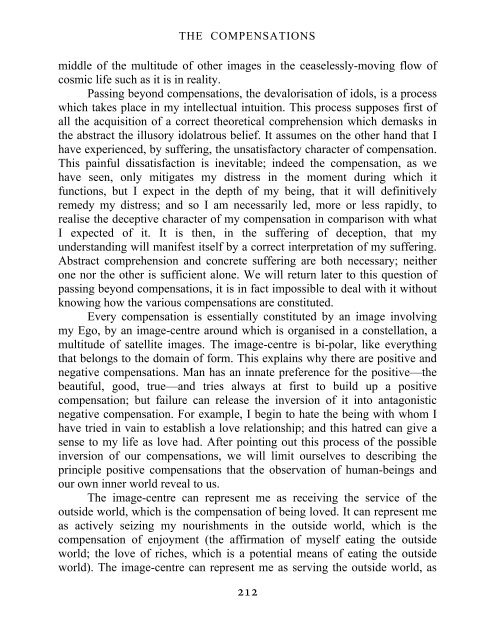The Supreme Doctrine - neo-alchemist
The Supreme Doctrine - neo-alchemist
The Supreme Doctrine - neo-alchemist
Create successful ePaper yourself
Turn your PDF publications into a flip-book with our unique Google optimized e-Paper software.
THE COMPENSATIONS<br />
middle of the multitude of other images in the ceaselessly-moving flow of<br />
cosmic life such as it is in reality.<br />
Passing beyond compensations, the devalorisation of idols, is a process<br />
which takes place in my intellectual intuition. This process supposes first of<br />
all the acquisition of a correct theoretical comprehension which demasks in<br />
the abstract the illusory idolatrous belief. It assumes on the other hand that I<br />
have experienced, by suffering, the unsatisfactory character of compensation.<br />
This painful dissatisfaction is inevitable; indeed the compensation, as we<br />
have seen, only mitigates my distress in the moment during which it<br />
functions, but I expect in the depth of my being, that it will definitively<br />
remedy my distress; and so I am necessarily led, more or less rapidly, to<br />
realise the deceptive character of my compensation in comparison with what<br />
I expected of it. It is then, in the suffering of deception, that my<br />
understanding will manifest itself by a correct interpretation of my suffering.<br />
Abstract comprehension and concrete suffering are both necessary; neither<br />
one nor the other is sufficient alone. We will return later to this question of<br />
passing beyond compensations, it is in fact impossible to deal with it without<br />
knowing how the various compensations are constituted.<br />
Every compensation is essentially constituted by an image involving<br />
my Ego, by an image-centre around which is organised in a constellation, a<br />
multitude of satellite images. <strong>The</strong> image-centre is bi-polar, like everything<br />
that belongs to the domain of form. This explains why there are positive and<br />
negative compensations. Man has an innate preference for the positive—the<br />
beautiful, good, true—and tries always at first to build up a positive<br />
compensation; but failure can release the inversion of it into antagonistic<br />
negative compensation. For example, I begin to hate the being with whom I<br />
have tried in vain to establish a love relationship; and this hatred can give a<br />
sense to my life as love had. After pointing out this process of the possible<br />
inversion of our compensations, we will limit ourselves to describing the<br />
principle positive compensations that the observation of human-beings and<br />
our own inner world reveal to us.<br />
<strong>The</strong> image-centre can represent me as receiving the service of the<br />
outside world, which is the compensation of being loved. It can represent me<br />
as actively seizing my nourishments in the outside world, which is the<br />
compensation of enjoyment (the affirmation of myself eating the outside<br />
world; the love of riches, which is a potential means of eating the outside<br />
world). <strong>The</strong> image-centre can represent me as serving the outside world, as<br />
212




